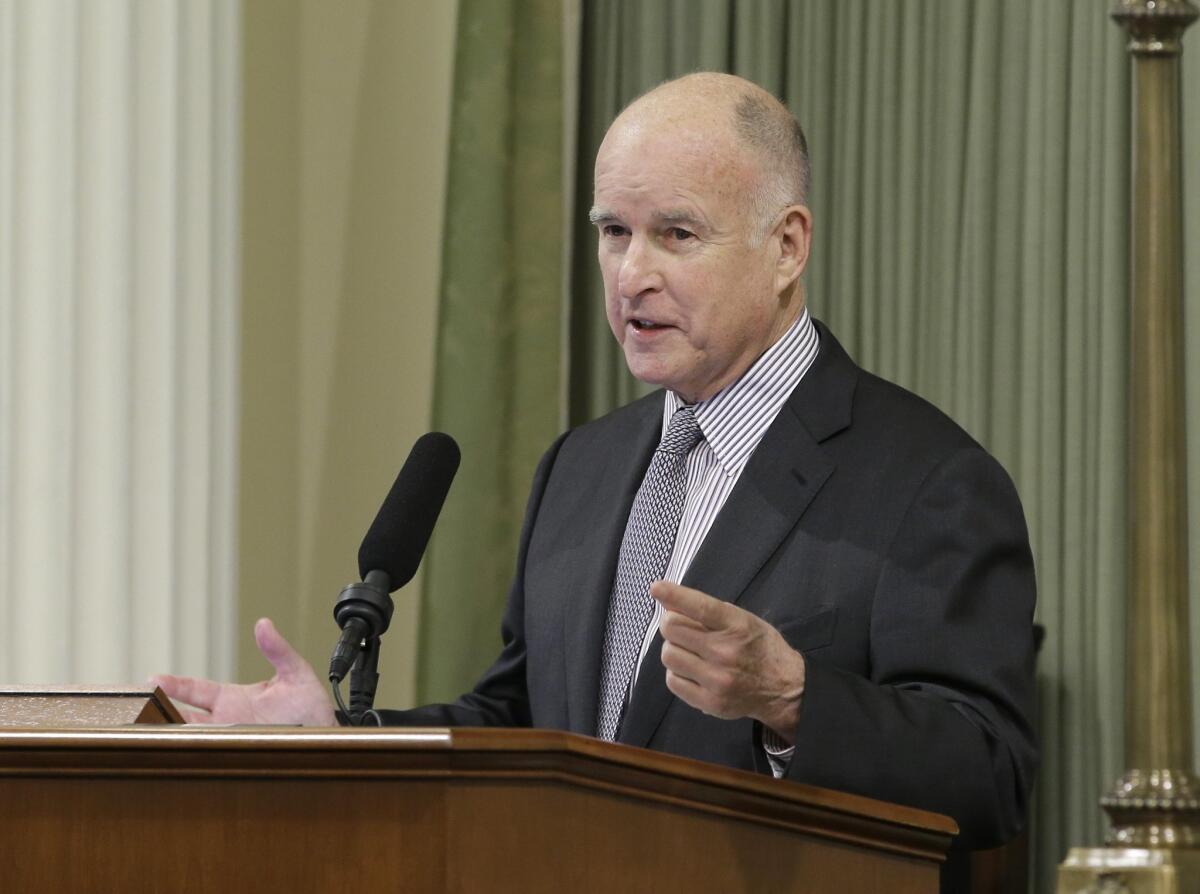Revamping the tax on healthcare plans proves tougher than Gov. Brown thought

Gov. Jerry Brown at his annual State of the State address.
Reporting from Sacramento — Three weeks ago, Gov. Jerry Brown confidently predicted that the vexing question of how to extend a tax on healthcare plans in order to fund state medical coverage for the poor was well on its way to being solved.
“We need the [managed care organization] tax now — this month,” Brown said. “We’re going to get it. We’ve got to get it.”
But as January has come to a close, his administration has yet to nail down an overhaul that can win support from the insurers, much less secure the Republican votes necessary to pass the Legislature.
The negotiations to find a replacement for the state’s current tax on managed care organizations, which expires in June, are complicated. The Obama administration has said that California must overhaul the tax structure or lose more than $1 billion in federal dollars for Medi-Cal, the California Medicaid program.
The Brown administration has crafted a package of tiered tax rates and relief from other levies — resulting in an overall financial gain to the industry. That framework generally has been endorsed by insurers and other business groups, but they have not publicly backed the nitty-gritty aspects of the plan.
Gareth Lacy, a spokesman for the governor, said that there have been “productive conversations” but that details aren’t yet public.
With daily conversations ongoing, a deal could materialize quickly.
Anthony Wright, executive director of the advocacy group Health Access, said he saw “a lot of momentum behind the MCO tax,” adding that a vote could be held as early as this week.
The arduous back-and-forth is due in part to the major policy changes the proposal entails.
The current tax on managed care organizations applies only to those that serve Medi-Cal patients. The Obama administration has said the new structure must cover all healthcare plans.
“The complexity of re-imagining and crafting an entirely new MCO tax cannot be understated,” said Nicole Kasabian Evans, a spokeswoman for the California Assn. of Health Plans.
Brown, joking with reporters during his budget rollout, acknowledged “very few people understand [the MCO tax]. ... I couldn’t explain it to you if I wanted to.”
According to a draft proposal obtained by The Times, the tax rates would vary based on the number of Medi-Cal enrollees and non-Medi-Cal beneficiaries in any given plan.
Kaiser Permanente, a major nonprofit plan, would have its own designated rate. Some small local plans based in Sacramento and San Diego counties would be exempted entirely.
The proposal also would eliminate corporation and insurance taxes for the managed care plans.
Predicting the new tax structure’s effect on the healthcare marketplace adds to the complexity.
“They’re competitors in an extremely competitive market. Even a 1% or 2% change in the price of their products ... can have a huge impact on their success,” said Micah Weinberg, president of the Bay Area Council Economic Institute.
Assuming the Brown administration can win over the bulk of the health insurers, there are still legislative politics to contend with.
The two-thirds vote in the Legislature required to impose new taxes means at least some Republican backing will be needed. Brown has been marketing the proposal as tax reform, to make the vote more palatable.
“This is not a tax increase, no matter what anyone tells you,” he said during his State of the State address.
Assembly GOP leader Chad Mayes of Yucca Valley has not ruled out his caucus’ support, but said he wants assurances that the taxes would not be passed along to customers through their health insurance premiums.
“We will not support a tax that hurts consumers,” Mayes said in a statement.
Even some Democrats are signaling wariness.
Sen. Cathleen Galgiani, a centrist from Stockton, has said she would not back a tax that is not ultimately approved by voters.
Meanwhile, other Democrats are eager to move past an issue that’s been under discussion since the early part of 2015.
“The Legislature’s patience with the health plans on this issue is wearing thin,” Sen. Ed Hernandez (D-West Covina) said in a statement.
“We have been working in good faith for over a year to address this problem. I’m disappointed the plans have been unwilling to get behind any proposal to date — including the current one that provides a net benefit to their industry. It’s time to stop playing games and move forward together.”
Times staff writer Patrick McGreevy contributed to this report.
Follow @melmason for more on California government and politics and sign up for our daily Essential Politics newsletter
ALSO:
Brown’s state budget set to include revised health tax
Follow the action in Sacramento on our Essential Politics news feed
More to Read
Sign up for Essential California
The most important California stories and recommendations in your inbox every morning.
You may occasionally receive promotional content from the Los Angeles Times.











